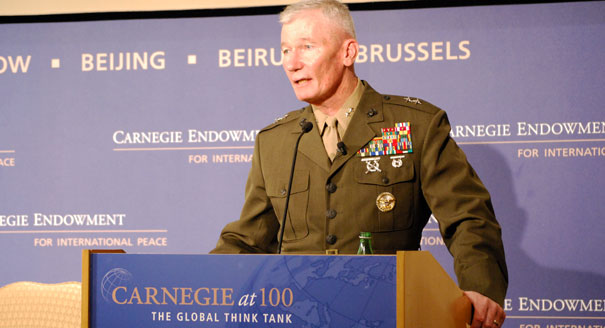Registration
You will receive an email confirming your registration.
Between taking command in March 2011 and March 2012, Major General John Toolan led Marines and coalition forces as they supported the International Security Assistance Force (ISAF) security and development efforts in the Helmand Province. Just back from Afghanistan, General Toolan discussed recent developments in Helmand province, the handover of responsibilities to Afghan forces, and prospects for a successful security transition.
Helmand Past and Present
- Changing Mission: General Toolan explained that the mission in Afghanistan has dramatically changed over the past several years. Initially the International Security Assistance Force (ISAF) sought to remove the Taliban and reduce its impact on the Afghan government. Today, ISAF is working to foster an environment of enduring security, self-governance, and economic sustainability in Afghanistan.
- Transformation in Helmand Province: General Toolan said he has seen significant progress in Helmand Province. He described the vast transformation in the cities of Marjah and Nawa from veritable “ghost towns” to more developed urban centers. The cities now have commercial trade, better schools, and more capable governance, he said. In this more auspicious environment, he has overseen Marjah and Nawa’s transition to Afghan control since taking command in 2011.
Current Priorities
General Toolan outlined the coalition forces’ current objectives to ensure long-term security and development in Helmand after 2014.
- Invest in Afghanistan’s Security Forces: Allied forces are training the Afghan army and police to establish lasting security mechanisms. ISAF is supporting local security forces with intelligence services, battlefield medicine, artillery, criminal investigation, and special operations. Some specialists in these areas will need to stay on past 2014, in order for the local police to establish security and credibility among the population, he added.
- Facilitate Commercial Development: NATO forces are facilitating commercial development by paving roads for regional trade, supporting agribusiness as an alternative to subsistence farming, and providing subsidized wheat and other seeds as an alternative to poppy cultivation.
- Engage Key Afghan Leaders: It is important to engage key Afghan leaders, and cultural awareness and language capabilities will be imperative for that process.
- Establish Rule of Law: One of the most important ways to ensure security and stability after 2014 is to establish governance and create a system of accountability. Allied forces are thus working to bring prosecutors and judges to Helmand Province to build the foundations for rule of law, though this is an exceedingly difficult and slow process.
Major Challenges
While there has been significant progress in the region, it is not irreversible, General Toolan warned. The most significant challenge is corruption, which could come in two forms:.
- Corruption in Government: Corruption could remain “parasitic” in the central government, he said. For example, dishonest officials use a weak central government to make money from drug trade. General Toolan explained that President Karzai is already subject to malign influence from corrupt advisers, and argued that the coalition must continue to strengthen the central government so that parasitic corruption cannot continue.
- Predatory Corruption: Corruption could also exist in the form of security officials preying on vulnerable members of the general population, added General Toolan. For example, officials could exhort money from local Afghans or seize land. General Toolan concluded that it is imperative that the coalition establish strong security mechanisms and rule of law to identify corruption and hold perpetrators accountable.
